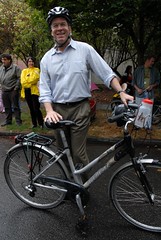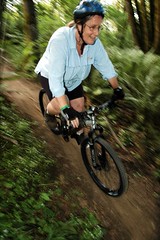“My interest is not in studying this to death, it’s seeing what we can actually do…I am committed to finding ways to significantly expand our current inventory of singletrack trails.”
— Nick Fish, Portland City Commissioner
The idea of mountain bike access in Forest Park has been an issue for Portlanders for over two decades. Local advocacy group, the Portland United Mountain Pedalers (PUMP) was founded over twenty years ago specifically to counter threats of bikes being prohibited from the park altogether (currently, bikes are allowed on all fire access roads and a .3 mile stretch of singletrack).
In recent years, the idea of adding more singletrack trails — or allowing bikes to ride on the many miles of existing hiking trails — has languished due to a variety of factors (that’s a whole other story entirely).
But recently, momentum has picked up for a new approach to the conversation: The League of American Bicyclists chastised Portland’s lack of urban off-road riding opportunities; the City of Portland Bureau of Transportation responded to that by officially adding a chapter on mountain biking to the update of their Bicycle Master Plan, citizen activists have stepped up their efforts, and fresh faces in City Hall bring the potential of a new perspective.
One of those new faces happens to be the commissioner in charge of the Portland Parks & Recreation Bureau, Nick Fish.
Unlike his predecessor Dan Saltzman, Fish bikes. When I interviewed Fish during his campaign he also told me that his wife was an avid cyclist and that, while he usually walks and takes transit to work from his inner Northeast home, he was warming to the idea of getting a bike.
Fast forward a few months to a bike event at a local elementary school (put together by one of Fish’s friends and political supporters — former city bike program manager and now planner Mia Birk) and there’s Fish astride a new Trek city bike.
When I called his office to chat about citizen advocate Frank Selker’s effort to thaw the Forest Park mountain bike access dialogue (which is turning out to be quite successful thus far), I wasn’t too surprised to hear that he was open to the idea.
I was however, a bit surprised at how open.
“It’s fair to say this issue is on our radar,” he said at the outset of our phone conversation last week. He went on; “I have seen a story or two on BikePortland about that.” So, it’s clear that Fish is aware of the renewed energy around this issue, but he also added that he and his staff are not “up-to-snuff on off-road biking,” — meaning they have some education to do before making any firm decisions.
Commissioner Fish brought up a white paper on mountain biking in Forest Park that is currently being drafted by the Forest Park Conservancy (the Parks Bureau was also involved with this, but sources say they’ve walked away from the process — more on that later). Wanting to have all pertinent information in hand, Fish said his plan was to have a meeting about the issue at the beginning of March, with the white paper in hand. At that time, he told me, “I think we can expdedite our consideration and then come up with some policy.”
This was interesting to hear because the old thinking on this issue was that no Forest Park policies would change until the city’s Forest Park Master Plan could be updated (when it was written, off-road biking barely existed).
I asked Fish if an update to that plan was necessary to change the bike access policy. “I don’t think so, no,” he said. He then continued:
“I was just at a Parks Bureau senior management retreat,” Fish shared, “and the theme was getting things done. I believe there are things we can consider that don’t require systemwide changes to make more singletrack trails happen.
I think there is a need and there is a demand and my job is to see how we can make that happen. I’m not interested in delaying this.”
“In the end, we’ll have a stronger coalition and in these times we need all the friends we can mobilize.”
Fish sounds very open to acting on the right plan for increase the amount of singletrack trails and bike access in Forest Park in general. But he’s not about to make a rash decision. “What we’re talking about is finding the right balance,” he explained. He also said that, “We have to balance the needs of our city,” which is typical politician speak, but then he went on to add:
“I come at this with a fresh look. I’m a new commissioner…my interest is not in studying this to death, it’s seeing what we can actually do. I assume everybody comes to the table in the good faith. I am committed to finding ways to significantly expand our current inventory of singletrack trails.”
Fish is not only be open to meeting a demand for off-road trails that this city can no longer ignore, but he see another benefit that will come with increased bike access in Forest Park.
If we can bring more users into the park, he said, “We’re also cultivating new coalitions that can help me do my job… which is supporting natural areas. In the end, we’ll have a stronger coalition and in these times we need all the friends we can mobilize.”




